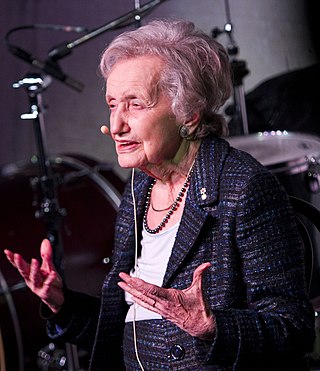
Brenda Milner is a British-Canadian neuropsychologist who has contributed extensively to the research literature on various topics in the field of clinical neuropsychology. Milner is a professor in the Department of Neurology and Neurosurgery at McGill University and a professor of Psychology at the Montreal Neurological Institute. As of 2020, she holds more than 25 honorary degrees and she continued to work in her nineties. Her current work covers many aspects of neuropsychology including her lifelong interest in the involvement of the temporal lobes in episodic memory. She is sometimes referred to as the founder of neuropsychology and has been essential in its development. She received the Balzan Prize for Cognitive Neuroscience in 2009, and the Kavli Prize in Neuroscience, together with John O'Keefe, and Marcus E. Raichle, in 2014. She turned 100 in July 2018 and at the time was still overseeing the work of researchers.

Patricia Goldman-Rakic was an American professor of neuroscience, neurology, psychiatry and psychology at Yale University School of Medicine. She pioneered multidisciplinary research of the prefrontal cortex and working memory.
Trevor William Robbins CBE FRS FMedSci is a Professor of cognitive neuroscience and former Head of the Department of Psychology at the University of Cambridge. Robbins interests are in the fields of cognitive neuroscience, behavioural neuroscience and psychopharmacology.
Gillian Patricia Bates FMedSci FRS is a British biologist. She is distinguished for her research into the molecular basis of Huntington's disease and in 1998 was awarded the GlaxoSmithKline Prize as a co-discoverer of the cause of this disease. As of 2016, she is Professor of Neurogenetics at UCL Institute of Neurology and the co-director of UCL Huntington's Disease Centre.

Ann Martin Graybiel is an Institute Professor and a faculty member in the Department of Brain and Cognitive Sciences at the Massachusetts Institute of Technology. She is also an investigator at the McGovern Institute for Brain Research. She is an expert on the basal ganglia and the neurophysiology of habit formation, implicit learning, and her work is relevant to Parkinson's disease, Huntington's disease, obsessive–compulsive disorder, substance abuse and other disorders that affect the basal ganglia.

Anne Buckingham Young is an American physician and neuroscientist who has made major contributions to the study of neurodegenerative diseases, with a focus on movement disorders like Huntington's disease and Parkinson's disease. Young completed her undergraduate studies at Vassar College and earned a dual MD/PhD from Johns Hopkins Medical School. She has held faculty positions at University of Michigan and Harvard University. She became the first female chief of service at Massachusetts General Hospital when she was appointed Chief of Neurology in 1991. She retired from this role and from clinical service in 2012. She is a member of many academic societies and has won numerous awards. Young is also the only person to have been president of both the international Society for Neuroscience and the American Neurological Association.
Andrea Hilary Brand is the Herchel Smith Professor of Molecular Biology and a Fellow of Jesus College, Cambridge. She heads a lab investigating nervous system development at the Gurdon Institute and the Department of Physiology, Development and Neuroscience. She developed the GAL4/UAS system with Norbert Perrimon which has been described as “a fly geneticist's Swiss army knife”.

Jeffrey Bryan Carroll is a scientific researcher in the field of Huntington's disease (HD). As a carrier of the abnormal gene that causes HD, he is also a public advocate for families affected by the disease, and co-founder of the HD research news platform HDBuzz. His life and work were the subject of a 2011 Gemini award-nominated CBC documentary feature. Carroll is an Associate Professor of neuroscience in the Department of Psychology at Western Washington University.
Barbara Jacquelyn Sahakian, is Professor of Clinical Neuropsychology at the Department of Psychiatry and Medical Research Council (MRC)/Wellcome Trust Behavioural and Clinical Neuroscience Institute, University of Cambridge. She is also an Honorary Clinical Psychologist at Addenbrooke's Hospital, Cambridge. She has an international reputation in the fields of cognitive psychopharmacology, neuroethics, neuropsychology, neuropsychiatry and neuroimaging.
The Department of Physiology, Development and Neuroscience, (PDN) is a part of the School of Biological Sciences at the University of Cambridge. Research in PDN focuses on three main areas: Cellular and Systems Physiology, Developmental and Reproductive Biology, and Neuroscience and is currently headed by Sarah Bray and William Colledge. The department was formed on 1 January 2006, within the School of Biological Sciences at the University of Cambridge from the merger of the Departments of Anatomy and Physiology. The department hosts the Centre for Trophoblast Research and has links with the Cambridge Centre for Brain Repair, the Cambridge Stem Cell Institute, and the Gurdon Institute.
Maria Grazia Spillantini, is Professor of Molecular Neurology in the Department of Clinical Neurosciences at the University of Cambridge. She is most noted for identifying the protein alpha-synuclein as the major component of Lewy bodies, the characteristic protein deposit found in the brain in Parkinson's disease and dementia with Lewy bodies. She has also identified mutations in the MAPT gene as a heritable cause for frontotemporal dementia.

Rosalind Ridley is a British psychologist and researcher who was head of the Medical Research Council Comparative Cognition Research Team in the Department of Psychology, Cambridge, UK, until 2005. She was a fellow of Newnham College, Cambridge from 1995–2010 and Vice-Principal from 2000–2005. She holds the privileges of a Fellow Emerita at Newnham College.
David Chaim Rubinsztein FRS FMedSci is the Deputy Director of the Cambridge Institute of Medical Research (CIMR), Professor of Molecular Neurogenetics at the University of Cambridge and a UK Dementia Research Institute Professor.

Sir Richard Lewis Maxwell Faull is a New Zealand neuroscientist and academic who specialises in human neurodegenerative diseases. He is a professor of anatomy and director of the Centre for Brain Research at the University of Auckland.
Kochupurackal P. Mohanakumar is an Indian chemical biologist, neuroscientist and the director of Inter University Centre for Biomedical Research and Super Specialty Hospital, Kottayam. He is a former chief scientist at the Indian Institute of Chemical Biology and is known for his studies on Parkinson's disease and Huntington’s disease. The Department of Biotechnology of the Government of India awarded him the National Bioscience Award for Career Development, one of the highest Indian science awards, for his contributions to biosciences in 2000.
Nihar Ranjan Jana is an Indian neuroscientist and a professor at the National Brain Research Centre. Known for his studies on E3 ubiquitin ligases, Jana is an elected fellow of the National Academy of Sciences, India. The Department of Biotechnology of the Government of India awarded him the National Bioscience Award for Career Development, one of the highest Indian science awards, for his contributions to biosciences in 2008.
Tara Keck is an American-British neuroscientist and Professor of Neuroscience and Wellcome Trust Senior Research Fellow, at University College London working in the Department of Neuroscience, Physiology, and Pharmacology. She studies experience-dependent synaptic plasticity, its effect on behaviour and how it changes during ageing and age-related diseases. She has worked in collaboration with the United Nations Population Fund on approaches for healthy ageing. Her recent work has focused on loneliness in older people, with a focus on gender. She was named a UNFPA Generations and Gender Fellow in 2022.
Baljit Singh Khakh is a British neuroscientist and Professor of Physiology and Neurobiology at the University of California, Los Angeles.
Laura Elizabeth Green is a British epidemiologist and academic who is Pro-vice-chancellor and Head of the College of Life and Environmental Sciences at the University of Birmingham. She serves on the council of the Biotechnology and Biological Sciences Research Council (BBSRC).
Azra Catherine Hilary Ghani is a British epidemiologist who is a professor of Infectious Disease Epidemiology at Imperial College London. Her research considers the mathematical modelling of infectious diseases, including malaria, bovine spongiform encephalopathy and coronavirus. She has worked with the World Health Organization on their technical strategy for malaria. She is associate director of the MRC Centre for Global Infectious Disease Analysis.






